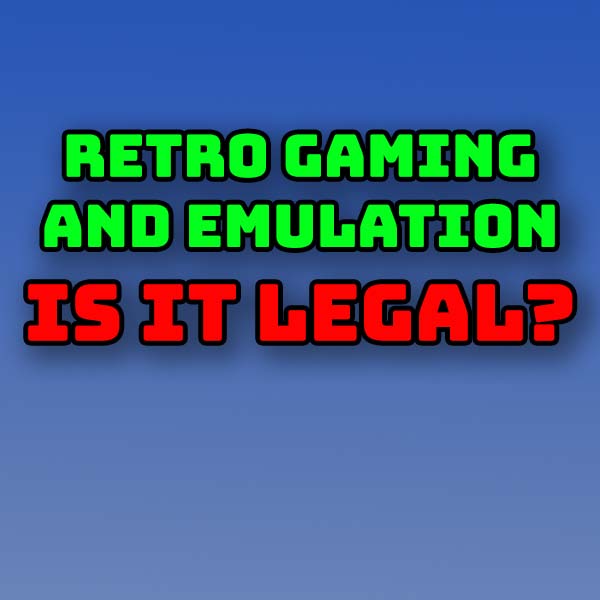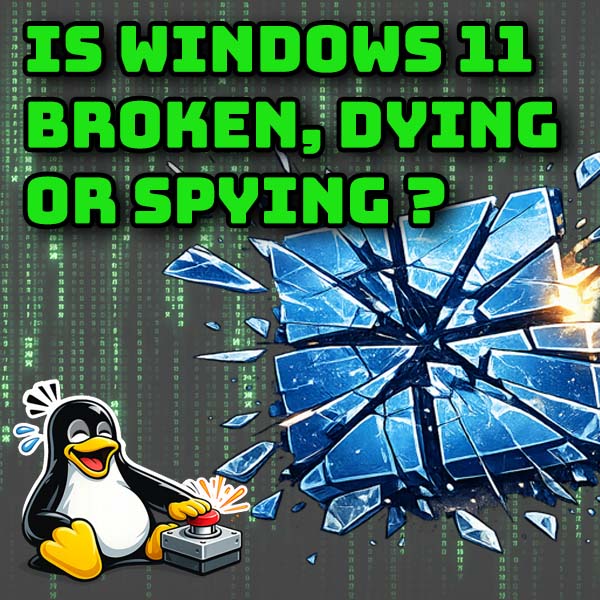
How to hack your Xbox360 and play any game you want – RGH3 mod
4th March 2024
DOS Gaming Made Easy with eXoDOS – 7500 games
10th April 2024Retro Gaming and Emulation – Is It Legal?
We all love playing our retro games. From 70’s and 80’s home computers and arcade classics, through the first generation consoles, right up to more modern PC and console titles. We can run these pieces of software on real hardware, or more commonly, using one of the fantastic system emulators. Many of these games haven’t been produced or sold for many years so we either have to find a second hand copy or resort to online game preservation archives.
So, finding retro game software has never been difficult, but is it legal.
Disclaimer
Before we start I do need to make you aware that any advice and recommendations in this video are simply my interpretations of the laws and general ethos of retro gaming. I am not legally qualified and you should consult with a legal expert before relying on anything I say, ever!
Buying Second Hand Games
First the easy one. If you buy a second hand, original game then there is no issue. You’ve met all the legal requirements and are now the proud owner of a piece of computing history.
Where it starts to get murky is when you make a backup copy of your original media.
If you want to preserve the original media so that you have a personal backup in case of damage then that’s fine in almost all countries. For example, playing a cassette tape for your ZX Spectrum or Commodore 64 game over and over will gradually destroy it. So, you make a tape to tape copy, or sample the data stream and save it to an mp3 file. This is fine, as long as it is your personal backup simply for protection against damage.
Where you will fall foul of the law is if you then lend, or worse sell, this copy to someone else. At this point it’s no longer considered a personal backup and you may well be visited by a team of black suited copyright enforcers in the middle of the night. Or even worse if it’s a Nintendo game you’ve infringed.
You’ll also break the copyright law if you sell the original copy but hold on to your backup copy. In this case you’ve passed on the legal right to possess the code so you should either pass on the backup copy with the original version, or destroy it.
Basically if you own the original media you own the right to play that game and usually to make a backup copy for yourself.
Downloading Game Backups
So it really boils down to the handling of these ‘backup’ copies.
During the 1980’s when games in the UK mostly came on a cassette tape, making tape to tape copies to share with your friends, more commonly known as software piracy, was common place. It was known to be going on and companies started creating unique copy protection schemes to stop it. But hardly any individuals were ever prosecuted for this game swapping practice. Where it did go wrong was when people started to sell compilation tapes of games or actual pirated copies of software titles.
Fast forward to today and we’re basically doing the same thing but on a much larger scale. All the files we find on the Internet are someone’s personal backup copy of an original set of media.
For example, places like Vimm’s Lair hold backups of pretty much every console game ever made. You can browse through any system, pull up game details and then download the code if you like the look of the game.
Similarly the Internet Archive has a wealth of software uploaded by individuals around the world. Simply search for what you’re looking for and it will generally pop up complete with download links on the project pages.
So with the software so readily available are we OK to just download and use it?
Although a lot of people will talk about this being a grey area, in reality I think the laws are fairly straight forward and all stem from both the personal backup ideas we’ve talked about and straight up software piracy.
Almost all of the software titles you’ll find, even right back to the 70’s and 80’s, will still be owned by someone or some company. Even though the software house that produced a game may not exist, they usually sold on the rights to their software as they went out of business.
Finding out who owns a game can be very difficult. But some software archivists do try to find out and try to get permission to distribute the game code. If this is given then downloading and playing the games is perfectly legal.
If permission is not given, or if no one can be found to ask for permission, then you should really assume the game is under copyright and not download it.
And this is where I think the idea of the grey area in the law comes to life.
For old games it’s easy to assume that the copyright holder doesn’t know, or care, if they own a game. It doesn’t make money for them and no harm is done in distributing the game. It lets enthusiasts keep the systems alive and encourages people to relive and understand our rich computing history. So, what possible damage could this do to the business that owns the intellectual rights?
Unfortunately, the law isn’t based on ‘for the good of the people’ principles. It basically says that distributing a copy of the software breaks the personal backup criteria which means the software copy is illegal. Downloading the game code is also illegal as you don’t have a right to possess a copy of that code. Even if you previously owned the game you no longer have that right so you will be in breach of the copyright laws.
Will You Get That Visit in the Middle of the Night?
I think it’s very clear that distributing or downloading game code is illegal unless you’ve got permission from the code owner.
But will the owner take action against you?
Again there’s a difference between the letter of the law and what is likely to happen in real life.
If you decide to distribute the software by starting a game download website you are probably taking a risk. A few years ago this copyright issue raised it’s head and a few sites were forced to close. Nintendo, why is it always Nintendo, started to pursue the matter and some sites, like Emuparadise, decided to preempt the legal issue and voluntarily removed their download links.
Just recently in March 2024 the Yuzu Nintendo Switch emulator came under attack. Although the developers didn’t infringe any Nintendo code, or supply any games, they were still hit with a $2.5 million settlement in favour of Nintendo and forced to remove and destroy all their emulation code. In this case the emulator was deemed to be contributing to extensive software piracy. To be honest though, I guess I can understand why Nintendo got angry. The Switch is still their premier product so emulation did have a real impact on their business, especially as some big game releases were leaked onto the emulation scene before their official launches which is bound to have pissed them off.
But what about the likes of us sitting at home downloading a few retro titles to have a play with?
Although you will likely be breaking copyright laws you can probably feel reasonably safe – again bear in mind I am not a legal expert so I’m not condoning this practice.
Will the copyright owners ever be able to discover who you are and what you’re doing? Will it be worth their while paying some lawyer to chase you down? What damages would they be likely to get if they did take you to court? Probably not enough to even make dent in the legal fees.
If we look at what has already happened over the past few decades of emulation it seems reasonable to assume that emulation users are not a target for the software houses provided you keep yourself to yourself and don’t actively distribute code. Going beyond that you start to expose yourself and I guess there’s a tipping point where you gain the corporation’s attention and they start to remind you that they hold all the cards in the copyright game.
Especially for older systems where the code and designs aren’t really usable it seems likely that you won’t have any issues. However, emulating and distributing current, or very recent, software, or leaking unreleased titles will almost certainly have the lawyers knocking on your door.
So, in general I’d advise buying a properly licensed copy if at all possible. If this is not an option try to find a software archive that can verify it has permission to download the code. Ultimately it’s your decision how you satisfy your retro gaming needs, but hopefully this video has explained some of the legalities involved in this often murky topic.




